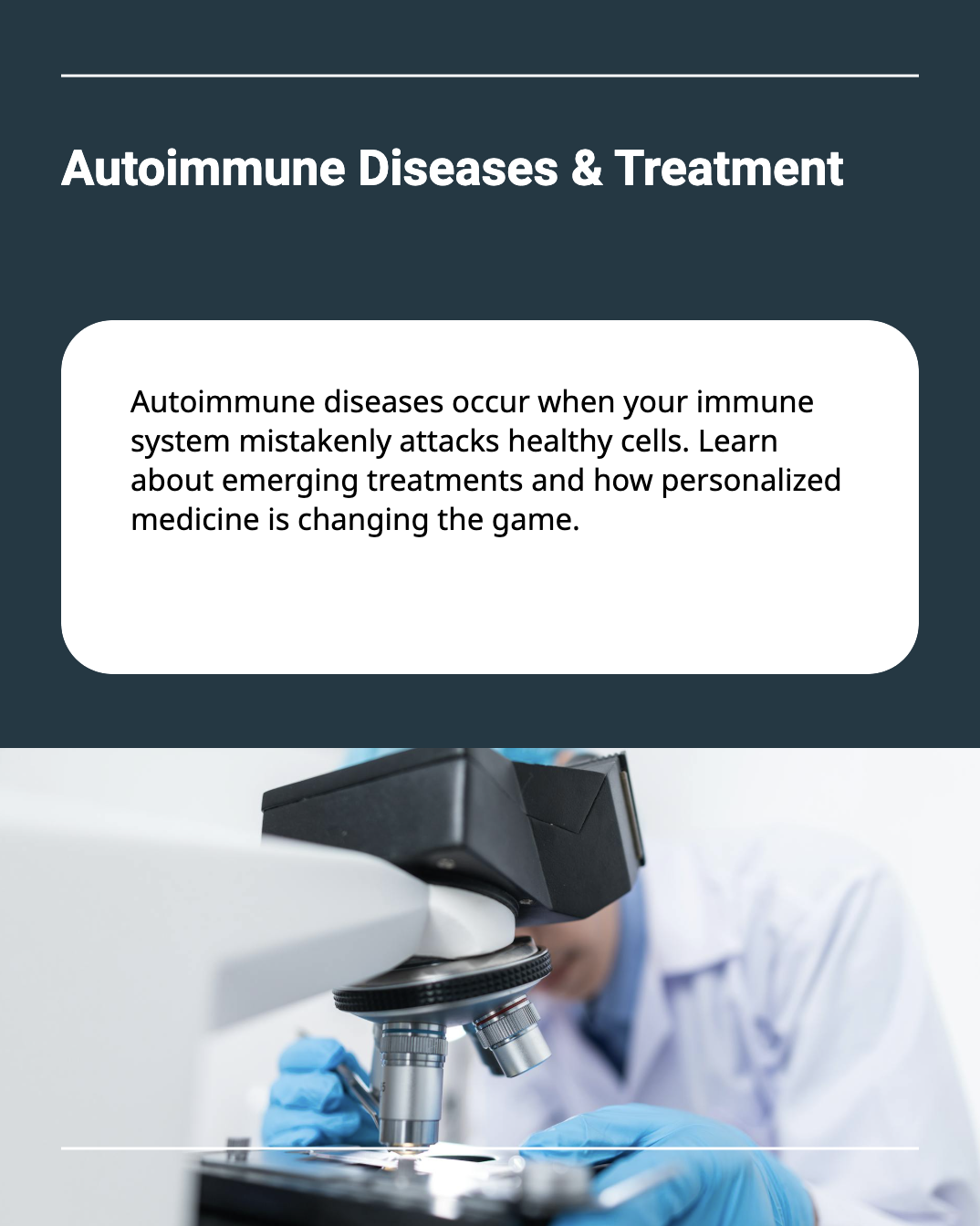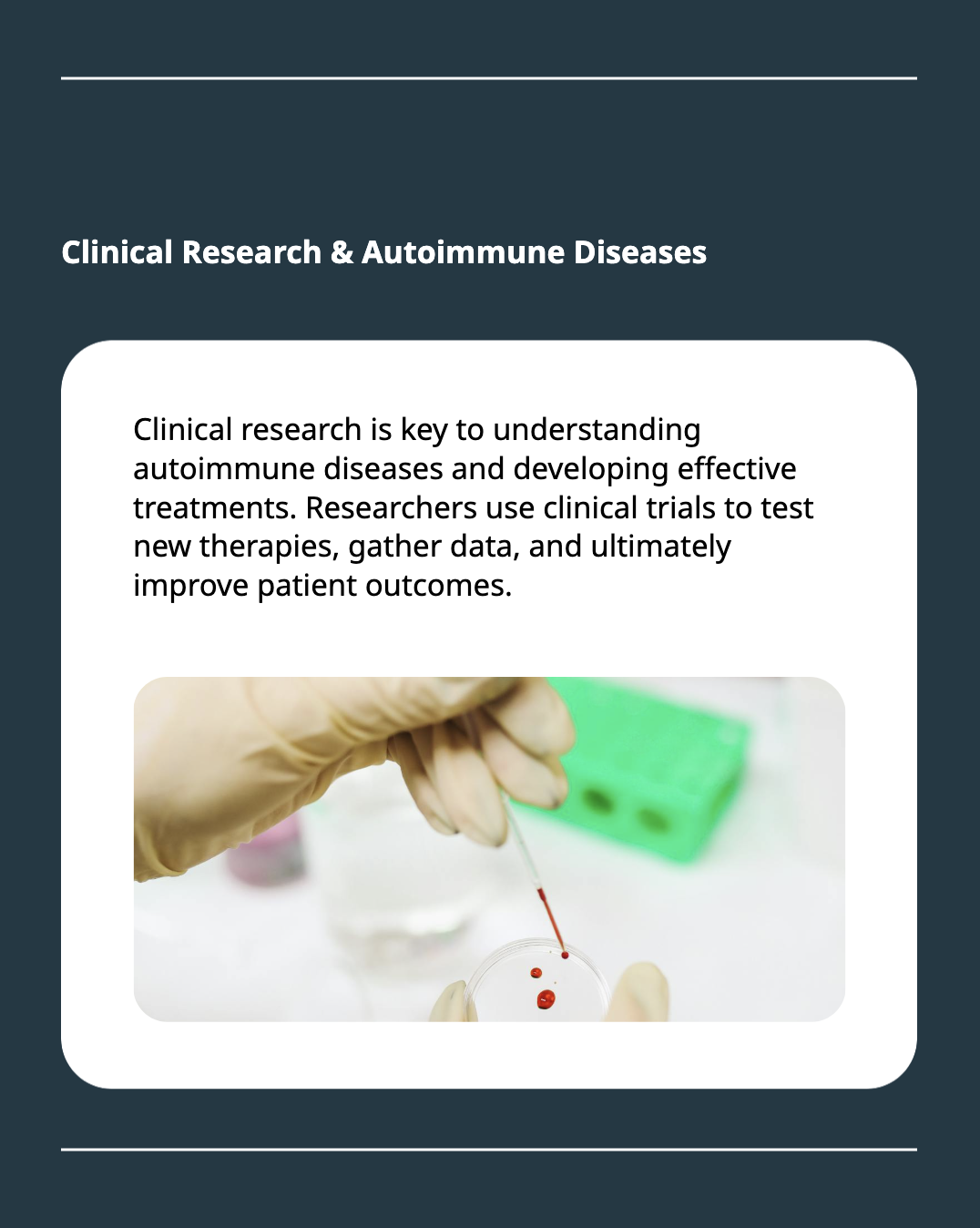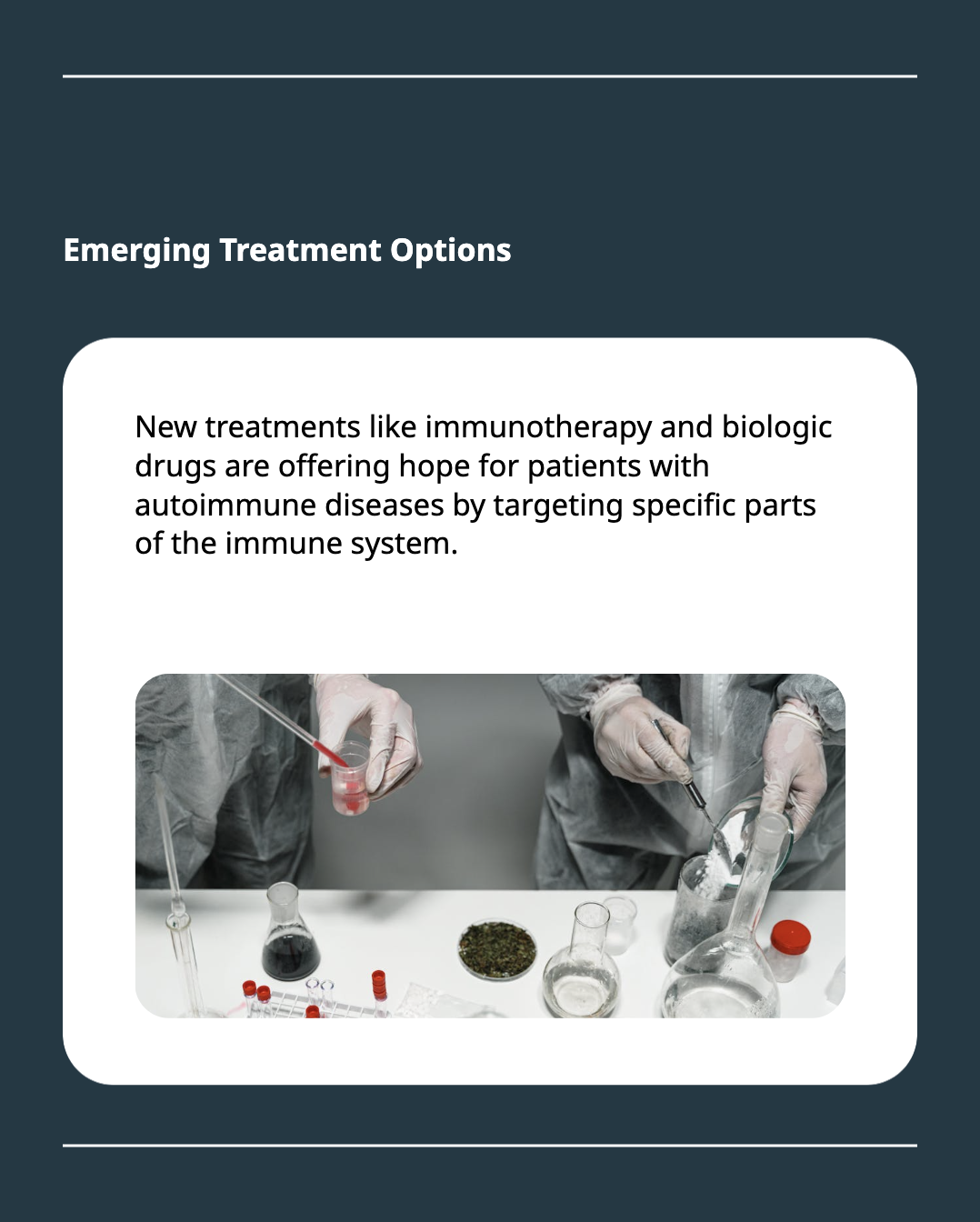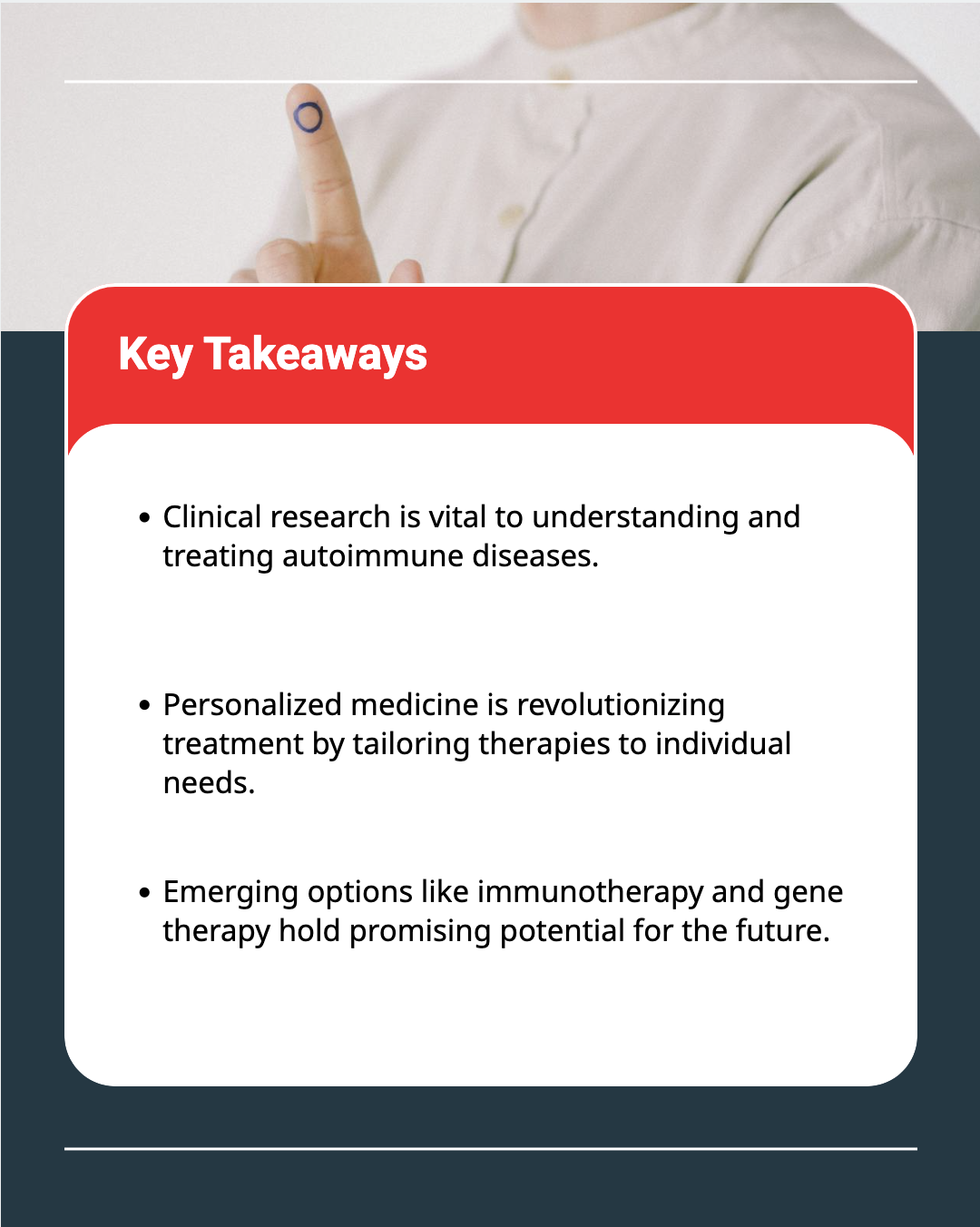Autoimmune diseases are conditions where the body's defense system mistakenly attacks its own cells and tissues. In our modern age, these disorders affect millions of people around the globe, causing discomfort, pain, and long-term health challenges. At the same time, exciting breakthroughs in clinical research are opening new doors for personalized treatments that target the root causes of these diseases. In this article, we explore how emerging treatment options and clinical research may pave the way for therapies that are custom-made for each patient. Our discussion will cover the basics of autoimmune diseases, current and emerging treatment methods, and the role clinical research plays in shaping personalized medicine.

Autoimmune diseases occur when the immune system, which normally fights infections, mistakenly targets healthy cells. These diseases can affect various parts of the body, making diagnosis and treatment a challenge. Some key points include:
There are many autoimmune diseases, each with its own set of symptoms and complications. Some of the most common include:
These examples show that autoimmune diseases are diverse, and the treatments often need to be tailored to the individual.

Clinical research is at the heart of discovering new treatments and improving patient outcomes. It helps us understand the underlying mechanisms of autoimmune diseases and guides the development of innovative therapies.
Importance of Clinical studies
Clinical studies are studies that test new drugs, therapies, or medical devices to ensure they are safe and effective. These studies play a vital role in:
By enrolling patients in clinical studies, researchers can observe how different therapies work in the real world, paving the way for more personalized treatments.
Personalized medicine tailors treatment to each patient's unique genetic makeup and lifestyle. For autoimmune diseases, this means:
Clinical research is critical in identifying which treatments work best for which patients, making the dream of personalized medicine a reality

As clinical research progresses, several emerging treatment options offer hope for those with autoimmune diseases. These innovations focus on understanding the body’s immune system and finding ways to correct its errors.
Immunotherapy
Immunotherapy is a groundbreaking approach that boosts or modulates the immune system to fight disease more effectively. In the context of autoimmune diseases, immunotherapy can help:
This treatment option is already showing promise in clinical studies, and its potential to be personalized makes it an exciting area of research.
Biologic Drugs
Biologic drugs are medications made from living cells that target specific components of the immune system. They are often used when traditional treatments fail. Key benefits include:
Clinical research is helping to refine these drugs, making them more effective and safer for long-term use.
Gene Therapy
Gene therapy is an emerging field that involves altering a person’s genes to treat or prevent disease. Although still in its early stages for autoimmune diseases, gene therapy holds the promise of:
Novel Approaches in Clinical studies
Researchers are also exploring other novel approaches in clinical studies, including:
These cutting-edge strategies are part of a larger trend toward more personalized and effective treatment plans.
Personalization in medical treatment means creating a plan that is as unique as the patient. It holds great promise for those suffering from autoimmune diseases.
Benefits of Personalized Treatment
Personalized treatment plans can offer many benefits, such as:
Challenges in Personalization
Despite its promise, personalized treatment faces several challenges:
By overcoming these hurdles, the future of personalized medicine in autoimmune diseases looks bright.
Clinical research provides the data and insights needed to make personalized treatments possible.
Data-Driven Decisions
Through clinical studies and research studies, scientists collect vast amounts of data on patient responses. This data helps in:
Real-World Applications
The insights gained from clinical research have already led to significant improvements in patient care. For example:
These advancements are the result of dedicated research efforts that blend science with the art of medicine.
The future of treating autoimmune diseases is bright, thanks to ongoing clinical research and technological advances.
Innovations on the Horizon
New innovations are on the horizon, including:
Collaborative Efforts in Clinical Research
Collaboration among researchers, pharmaceutical companies, and healthcare providers is crucial. Together, they can:
Such collaborations underscore the importance of clinical research in turning innovative ideas into real-world treatments.
While the promise of personalized treatment is immense, several challenges must be addressed.
Funding and Accessibility
One of the biggest hurdles is funding. Research can be costly, and not every promising idea receives the necessary support. This leads to:
Regulatory Hurdles
Clinical research must adhere to strict regulations to ensure patient safety. These include:
Ethical Considerations
Ethics play a vital role in clinical research. It is important to consider:
Researchers must navigate these challenges carefully to maintain trust and integrity in their work.
The ultimate goal of clinical research and personalized treatment is to improve the lives of patients with autoimmune diseases.
Success Stories
Across the globe, patients are experiencing remarkable improvements thanks to personalized treatments. For instance:
These success stories highlight the real-world benefits of merging clinical research with personalized medicine.
Patient Empowerment
Clinical research not only develops new treatments but also empowers patients. With more data and better understanding, patients are:
Below is a table summarizing several emerging treatment options for autoimmune diseases:
| TREATMENT OPTION | DESCRIPTION | KEY BENEFIT |
|---|---|---|
| Immunotherapy | Modulates the immune system to reduce self-attack | Precision targeting and regulation |
| Biologic Drugs | Uses living cells to target specific immune pathways | Reduced side effects and improved efficacy |
| Gene Therapy | Alters genes to correct underlying causes | Potential for long-term relief |
| Stem Cell Therapy | Regenerates damaged tissues | Promotes tissue repair and immune reset |
| Microbiome Modulation | Adjusts gut bacteria to improve overall immune function | Enhances natural immune balance |
The journey from clinical research to daily treatment is complex yet promising. This bridge is built on rigorous scientific studies, ethical practices, and a commitment to patient well-being. As researchers continue to unlock the secrets of autoimmune diseases, the translation of these findings into everyday therapies becomes increasingly seamless.
Data-Driven Insights for Better Care
Researchers are gathering valuable data from clinical studies that reveal how patients respond to different therapies. These insights help in refining treatments and ensuring that they are as effective as possible. With data on genetics, lifestyle, and environmental factors, doctors can create more accurate treatment plans.
Real-World Impact
Patients participating in clinical studies are often the first to benefit from the latest research. Their experiences and outcomes provide feedback that fuels further innovations. This loop of research and real-world application ensures that treatments continue to improve over time, ultimately offering patients more reliable and effective options.

As we look ahead, the integration of clinical research with personalized treatment strategies will likely transform how autoimmune diseases are managed. By focusing on the individual, we can move away from generic treatments and toward therapies that truly make a difference.
Innovative Research Techniques
Modern research techniques such as high-throughput screening, next-generation sequencing, and advanced imaging are accelerating discoveries. These technologies allow for a deeper understanding of how autoimmune diseases work, which in turn fuels the development of targeted treatments.
Collaborative Networks
The future of autoimmune disease treatment is also being shaped by global collaborations. Research networks that bring together experts from different fields are paving the way for innovative approaches and faster breakthroughs. This collaborative spirit is essential to addressing the many challenges that remain.

Autoimmune diseases present a significant challenge due to their complexity and varied nature. However, emerging treatment options like immunotherapy, biologic drugs, and even gene therapy offer hope for more personalized, effective care. Clinical research plays a pivotal role in turning these innovative ideas into real-world treatments. By embracing a personalized approach, we can empower patients, improve treatment outcomes, and ultimately transform lives. The future of managing autoimmune diseases is bright, with ongoing research and collaboration leading the way toward treatments that are as unique as the individuals they serve.
Autoimmune diseases occur when the immune system mistakenly attacks healthy cells. This can lead to chronic inflammation and damage in various parts of the body, affecting joints, organs, and overall health.
Clinical research provides vital data from clinical studies and studies, which helps in understanding disease mechanisms and developing treatments that are specifically tailored to the needs of each patient.
Personalized medicine tailors treatment to an individual’s genetic makeup and lifestyle. This approach improves the effectiveness of treatments, reduces side effects, and empowers patients by focusing on their unique needs.
While emerging treatments show great promise, they are still being thoroughly tested in clinical studies to ensure safety and effectiveness before becoming widely available.
Patients can talk to their healthcare providers about participating in clinical studies. Many research centers and hospitals have programs that allow patients to contribute to the advancement of treatment options.
 04.03.2025
04.03.2025